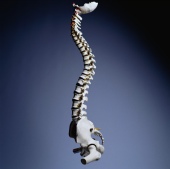Correlation, but no prediction of 12-month outcomes after lumbar spine sx for degenerative disease
TUESDAY, May 5, 2015 (HealthDay News) — For patients undergoing lumbar spine surgery for degenerative disease, patient-reported measures of treatment effectiveness obtained at three months correlate with, but do not reliably predict, 12-month measures, according to a study presented at the annual meeting of the American Association of Neurological Surgeons (AANS), held from May 2 to 6 in Washington, D.C.
Matthew Joseph McGirt, M.D., from Carolina Neurosurgery & Spine Associates in Charlotte, N.C., and colleagues examined whether three-month patient-reported outcomes accurately predict 12-month outcomes for patients undergoing lumbar spine surgery for degenerative disease. Data were included for 593 patients who reported outcomes at baseline and at three and 12 months postoperatively.
The researchers observed a correlation between three- and 12-month general health (EuroQOL five-dimension questionnaire [EQ-5D]) and disability (Oswestry Disability Index [ODI]) outcomes (both P < 0.0001). At three versus 12 months there was a considerable discrepancy in achievement of minimal clinically important difference (MCID) threshold on the individual patient level. For ODI, achieving MCID at three months accurately predicted 12-month MCID with specificity and sensitivity of 62.6 and 86.8 percent, respectively. For EQ-5D, achieving MCID at three months accurately predicted 12-month MCID with specificity and sensitivity of 87.7 and 87.2 percent, respectively.
“Patient-reported measures of treatment effectiveness obtained at three months correlated with 12-month measures overall in aggregate, but did not reliably predict 12-month outcome at the patient level,” according to the AANS news release.
Copyright © 2015 HealthDay. All rights reserved.








